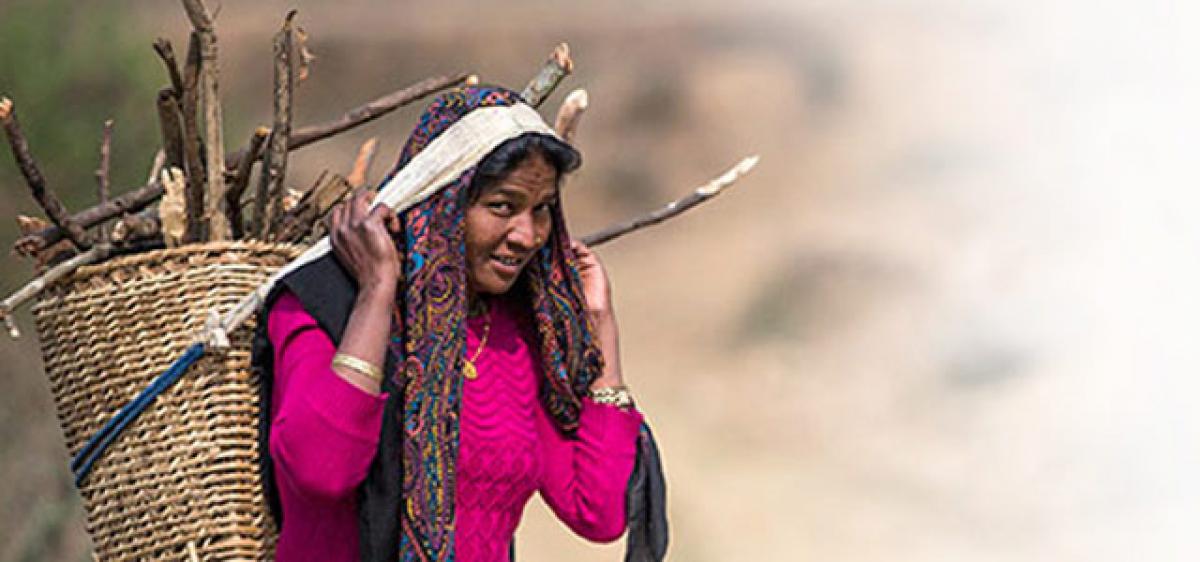Live
- UpStudy: The Smart Solution for Homework Hassles
- Actress Rithika and models inaugurate Sutraa Lifestyle Exhibition
- Loud campaign
- Faculty students celebrated english literature day in Government Degree College
- Huge fire accident.. Shops of street vendors burnt in the fire
- Pawan Kalyan promises to protect the coastal area from sea erosion
- EC Transfers Two Senior IPS Officers in AP ahead of Elections
- DMK analysis predicts victory for INDIA bloc in TN but concedes gains for BJP and NDA too
- India showcasing innovative technologies at World Energy Congress
- IPL 2024: Mitchell comes in for Ravindra as Lucknow opt to bowl first against Chennai
Just In

It is early morning on the outskirts of Gorkha Bajar, headquarters of Gorkha district as well as the epicentre of the April 2015 earthquake that rocked Nepal. Laxmi Biswokarma, 39, is walking towards her house with a small load of firewood on her back. “This load is not heavy; I just can’t carry that limited amount,” she says, as she climbs a small slope that leads to her home. It has been an extr
A tale of grit and determination
It is early morning on the outskirts of Gorkha Bajar, headquarters of Gorkha district as well as the epicentre of the April 2015 earthquake that rocked Nepal. Laxmi Biswokarma, 39, is walking towards her house with a small load of firewood on her back. “This load is not heavy; I just can’t carry that limited amount,” she says, as she climbs a small slope that leads to her home. It has been an extremely challenging time for Laxmi. In early 2015, she returned to Nepal from Dubai, where she was working as a domestic worker.
“I had excruciating pain in my back. I couldn’t work; I couldn’t sit,” she says as she sets the firewood down. Laxmi took a leave of absence for a few months in January 2015, and was admitted to a hospital in the capital, Kathmandu. On April 25, when the 7.8-magnitude earthquake hit central Nepal, she was still in hospital.
The doctors had diagnosed her with diabetes and tuberculosis and told her she needed physiotherapy if she wanted to walk again. Unfortunately, her savings had run out by then. “I didn’t even have enough money for food, how could I afford medicine and therapy?” she recalls.
Six years earlier, when Laxmi had left Nepal for the first time, she had gone to Oman as a migrant worker. When she returned, she used her savings to build a house near the village of Uiya, over 200 kilometres from Kathmandu, and just above the epicentre of the devastating earthquake. She lived there for a few years before she went off to Dubai.
“Now that home is gone, turned into a pile of dust,” she says. Laxmi hasn’t been able to muster the courage to go back to her village. Her house was built with brick and mortar so it wouldn’t have withstood the devastating tremors.
After leaving the hospital, she came to Gorkha instead, where Suk Maya Gurung, a social mobiliser with the Women for Human Rights (WHR), a local women’s group, came to know about her situation. “She was renting a cheap room on the outskirts of town; she didn’t have food, or medicine… she didn’t even have anyone to give her water when she was thirsty,” shares Suk Maya.
Fortunately for Laxmi, the WHR set up a multipurpose women’s centre as part of the humanitarian response to the earthquake, with support from UN Women and the district’s Women and Children office. The centre provides trauma counselling, dignity kits, solar lamps, information and referrals. Additionally, it conducts women’s safety audits and facilitates early recovery and livelihood activities.
At Suk Maya’s advice Laxmi came to the multipurpose centre where she was able to get help, spend some time with other women, receive psychosocial counselling, and make sure that she could take her medicine. “I would go there every other day —they would give me nutritious food; I could get help taking a bath; they took me to the hospital,” says Laxmi, adding, “I probably would have died had it not been for the help I received at the centre.”
Having undergone some rigorous treatment and therapy, Laxmi is a different person today. As someone who has worked with her over a length of time, Bimala Amgai, a psychosocial counsellor with the WHR, has seen the change in her. “When I had started to talk to her, she was mentally broken and talked about wanting to die all the time,” she says, adding, “Laxmi couldn’t even lift herself properly. These days, she can walk and take care of herself and is thinking ahead.”
As she slowly regains her strength, Laxmi has started planning for the future. She wants to start working so that she can pay back the loan she took to complete her treatment. She wants to learn a new skill such as the English-language. “I have no education, but if I can learn English, it will be an added advantage when I apply for jobs abroad,” she says.
She is modest but hopeful about the future as she talks about going abroad again as a migrant worker. “I don’t have big plans... all I want is to go abroad, earn some money, pay off my loans, have some savings for old age and be at peace,” she signs off.
(This article is part of UN Women’s ‘Step It Up for Gender Equality’ campaign)

© 2024 Hyderabad Media House Limited/The Hans India. All rights reserved. Powered by hocalwire.com







